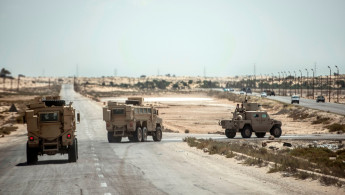Egypt kills 21 Sinai jihadists planning 'Eid attacks'
The interior ministry said in a statement that police raided two hideouts of "terrorist elements" in North Sinai governorate, sparking a gunbattle in which two officers were also wounded.
It said the two groups had been planning attacks during the major Islamic holiday of Eid al-Fitr, which starts in Egypt on Sunday.
Security forces had found automatic weapons and suicide belts in the hideouts.
Security forces have been battling a long-running Islamist insurgency in the Sinai Peninsula - in Egypt's northeast - that is spearheaded by a local affiliate of the Islamic State group.
The fighting intensified after the military's 2013 ouster of Islamist president Mohamed Morsi.
In February 2018, security forces launched a nationwide operation against militants, focused on North Sinai.
Around 950 suspected militants have been killed in the region along with dozens of security personnel, according to official figures.
Twitter Post
|
The military has reported far more militant casualties than the estimated number of fighters in the area.
Read also: Egypt releases over 4,000 prisoners to mark Sinai Liberation Day, without mention of coronavirus crisis
Rights groups have accused the Egyptian military of attacking civilians mistaken for militants, as well as inflating militant death tolls to include those of civilians.
Last month, families of Egyptians killed in the crossfire in the North Sinai have complained that their state benefits have been cut amid the coronavirus crisis that threatens to further cripple Egypt's battered economy.
Authorities tasked with providing the special salaries to local residents have not explained why the benefits have been cut but a near-total media blackout means the Egyptian government rarely acknowledges civilian deaths in the Sinai offensive.
"Accidental" injuries and deaths acknowledged by the media are liable for payments from the authorities, locals told The New Arab's Arabic-language sister site.
Favourable connections with the authorities play a large part in who receives such handouts, so many families in the especially marginalised areas of Rafah, Sheikh Zuwayid and the outskirts of Al-Arish go without.
Hundreds of people are thought to receive such pay-outs, according to local sources.
Follow us on Facebook, Twitter and Instagram to stay connected





 Follow the Middle East's top stories in English at The New Arab on Google News
Follow the Middle East's top stories in English at The New Arab on Google News
![Israeli forces ordered bombed Gaza's Jabalia, ordering residents to leave [Getty]](/sites/default/files/styles/image_330x185/public/2176418030.jpeg?h=a5f2f23a&itok=_YGZaP1z)

